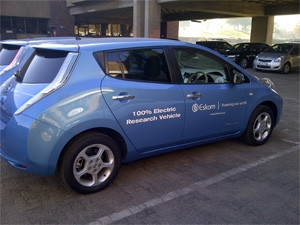
A couple of months into its research, Eskom is already a step closer to understanding user behaviour, infrastructure requirements and expected challenges with the introduction of electric vehicles (EVs) into the South African market.
In May, Eskom received 10 Nissan Leaf all-electric cars as part of a research project to study the charging requirements and characteristics of EVs. According to Eskom GM for research, testing and development, Barry MacColl, Eskom has signed a lease-agreement with Nissan to conduct the research over a period of three years.
Only a few months into the research, a few interesting facts have already emerged. MacColl says each car is fitted with a tracker device that monitors where and how far the vehicle goes. Each Leaf also has device on board that records certain information. Eskom has already done 3 375 trips totalling 36 142km over 1 193 hours with the vehicles.
"The energy consumption for the 10 vehicles on average was 0.19kWh and that equates to an electricity cost of R1.30 per kWh," he says. "This is about 4.2 times cheaper than the petrol cost for the equivalent distance, so a 76% saving on fuel costs."
He emphasises he does not want to debate the price of EVs and whether it is a cost-effective option, as Eskom only aims to understand the use and energy demand and consumption of the vehicles.
The Nissan Leaf went on sale in SA last month, at a retail price of R446 000 including a three-year/90 000km service plan.
Mike Whitfield, MD of Nissan SA, defended the Leaf's "justifiably higher purchase price", saying overall cost of ownership is competitive thanks to the significantly lower price of electricity compared to that of petrol or diesel, and the way in which the Leaf is able to harness its power for maximum effectiveness.
Driver behaviour
MacColl says the impact of "range-anxiety" is another interesting aspect that has emerged during its research. The study has shown the average starting capacity of the vehicle batteries to be 83%, with the average battery end-capacity at 65%. He explains this shows EV owners on average do not charge the battery to full capacity for a variety of reasons, and they rather "top up" as they go along. This user behaviour can be attributed to range-anxiety, where drivers are anxious they will be stranded with a flat battery.

For Eskom, this means that because EVs will be charged often and at different times during the day, there will need to be a large number of charging stations available, not only at owners' houses, but also at shopping centres, office blocks, schools, etc, says MacColl. This will also mean that fast-charging stations will be more used than normal charging-stations, which will have a significant financial implication as fast-charging stations are much more expensive.
"The times of charging will be spread out, which is good for us because everyone wants to use electricity in the morning and the evening [for other purposes]," says MacColl. "It looks like the centralisation of charging facilities will be around large shopping and office areas, such as Sandton CBD. People will be charging there because it is more convenient, the infrastructure exists and in some cases they won't be paying for the charge."
Electricity pressure
The Leaf has got a 24kWh lithium-ion battery, and when fully charged, delivers an average range of 160km. MacColl explains that an average residential home uses about 30kWh of electricity a day. "If you were to charge that electric car from empty to full every day, that would equate to 24kWh energy, but we have already seen that the cars do not get fully charged every day. We are actually charging between 20% and 30% [of the EV battery] every day. So we could say about half a house's [electricity consumption] is the equivalent to putting an EV on the grid."
He says this is one of the main reasons for the research being done, as Eskom does not want to exacerbate SA's already struggling power grid. Various options are being looked at, says MacColl, including the possibility of time-of-use tariffs that will encourage consumers to charge their vehicles during off-peak periods.
MacColl explains that the Leaf has a timer on board that allows the driver to identify certain times of the day that the vehicle can charge. In other words, drivers can then opt for the vehicle to only charge during off-peak periods. This creates the possibility to introduce a manufacturing difference in the cars that correlates with a difference in purchase price. In other words, an EV that can charge 24 hours a day will be more expensive than the same model that can only charge during off-peak periods.
Solar energy is another option that is intensely scrutinised by Eskom, as well as the storage of energy generated by natural elements.
MacColl notes the process of South African consumers switching from fossil-based to electricity-based transportation is most likely a matter of decades and not years. "Over time we will likely see the price of EVs come down, the price of solar charging systems come down, the [distance] range of these vehicles go up, and it will become an increasingly attractive option to consumers."
Share